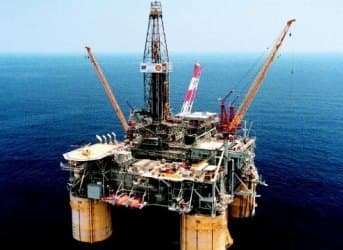A BP official who led the company before the 2010 incident in the Gulf of Mexico marked his return to the region in a $3.75 billion deal with Houston-based Apache. Apache seemingly said goodbye to the Gulf of Mexico in the deal, opting instead to focus its efforts onshore. Former BP Chief Executive John Browne helped nab 1.9 million net acres in the agreement with Apache last week. Apache's "good run" in the Gulf of Mexico may suggest assets onshore may hold more long-term value for explorers.
Apache unloaded its assets to Fieldwood Energy, an entity held by Riverstone Holdings LLC. Fieldwood CEO Matt McCarrol said his company would take over where Apache left off, adding his company was "very enthusiastic about the opportunity to continue this legacy going forward." McCarrol said the assets obtained through the deal make up more than 500 blocks encompassing 1.9 million net acres. By the end of last year, the company said the area had proved reserves of 239 million barrels of oil equivalent, of which 55 percent is oil.
Riverstone Holdings LLC includes former BP chief John Browne, whose tenure ended in 2007 with the arrival of Tony Hayward. Under Browne, BP became one of the premier energy companies working in the Gulf of Mexico. By 2010, the company, as well as Hayward, became the subject of public scorn after the Deepwater Horizon oil disaster. Two high-ranking BP officials were charged in 2012 with misleading investigators during their investigation into the spill.
Related article: Will an End to Pemex’s Monopoly Boost Economic Growth in Mexico?
Apache CEO G. Steven Farris said the deal was an "important step" in restructuring his company's portfolio. Since 2010, the company has focused its efforts on developing onshore assets, where it said it expects to achieve attractive rates of return. Farris said the assets sold to Browne and his associates had matured to the point that they were more difficult to exploit than onshore plays.
New drilling technologies have contributed to exponential production gains for onshore oil and natural gas in the United States. The North Dakota Department of Mineral Resources said last week it produced, on average, 810,129 barrels of oil per day in May, a new all-time high and a 2 percent increase from the previous month. Oil field services company Baker Hughes said most of the new wells started during the second quarter of 2013 came from the Eagle Ford and Permian basins spread across the southern United States. Apache says it's one of the largest operators in the Permian basin with more than 12,000 wells in service. During the first quarter of the year, the Permian basin gave up more than 119,000 barrels of oil equivalent per day for Apache, a 20 percent increase year-on-year.
Apache's CEO said his company "had a great run on the Gulf of Mexico shelf over the last 30 years." The Energy Department said it expects oil production in the Gulf to reach 1.5 million bpd by December 2014, up from the 1.26 million bpd recorded in March. The Gulf is still giving up substantial amounts of oil, but Apache seems to be betting the biggest bonanza will be onshore.
By. Daniel J. Graeber of Oilprice.com



















No words are storng enough to describe the fact! That anger, rage, that We THE People, feel, that Big Oil has destroyed every Living Thing in the Gulf of Mexico, and the cfountries bordering it, as well as the outlet to the Bathtub!!
So NOW, they're looking to fuck up new areas.
When the KNOW that there is Free Energy.
But for gold, the greed, the creatures, not Native to this Planet, the Alien creatures, will do ANYTHING!
Louisiana's wetlands were nearly destroyed by the toxic chemical Corexit, which also sickened many of the Gulf's human population, especially fishermen and cleanup workers. It will take years, maybe decades, at best to restore the Gulf and its environs. It took that long for the Prince William Sound area in Alaska to recover from the Exxon Valdez disaster; so, shall it take decades for the Gulf of Mexico to recover from BP's oil spill disaster.